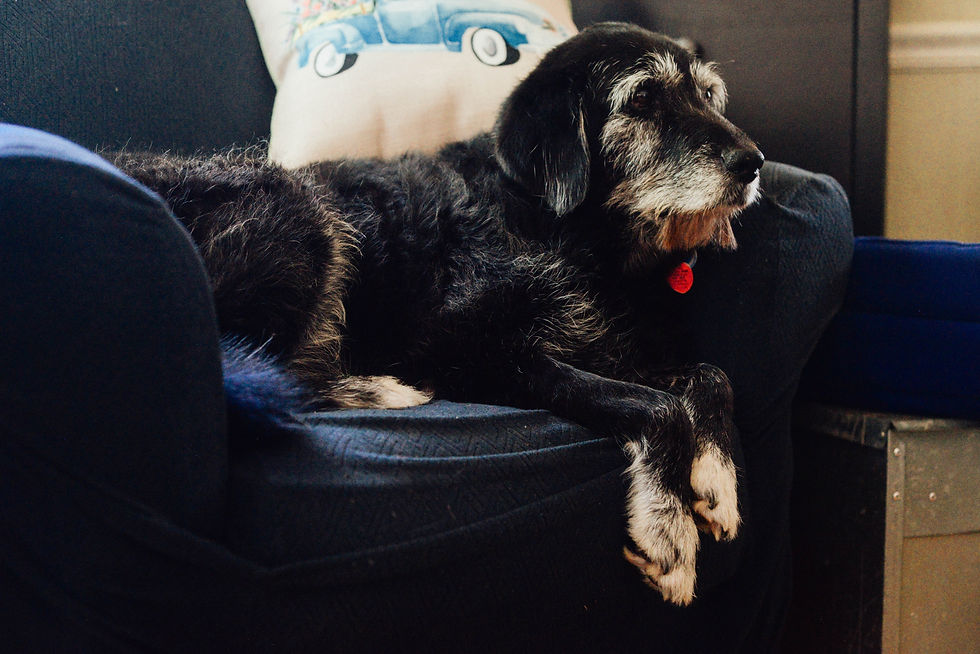How To Care For Your Pet After Surgery
- Shirley Williams
- 7 days ago
- 3 min read
What to look for, and what you can do to provide comfort post surgery.

Bringing your pet home after surgery can feel overwhelming. They may be groggy, uncomfortable, or even a little cranky. The good news is that with some preparation and extra care, you can make their recovery smoother and less stressful.
Here are ten tips to help you comfort and care for your pet after surgery.
Tip #1 - Set up a quiet, cozy space
Give your pet a calm area away from noise, kids, or other pets. A soft bed, dim lighting, and familiar blankets can help them feel safe and relaxed.
Tip #2 - Follow the vet’s instructions carefully
From medications to activity limits, your vet’s advice is your roadmap. Stick to it closely—don’t skip doses or let your pet get too active too soon.
“If a pet is less active following a procedure, it is usually best to let them set their own pace for getting back to normal activity levels. However, many surgeries require a period of reduced activity for proper healing to take place … One shared feature among most surgeries is the risk of infection. Because infections are easier to treat before they become severe, owners should be on the lookout for any changes at the incision site after surgery.” Dr. Jacqueline Davidson Texas A&M Vet Med
Tip #3 - Monitor the incision site
Check the surgical area daily. Look for swelling, redness, or discharge. A little bruising is normal, but if you notice anything unusual, call your vet right away.
Tip #4 - Prevent licking or chewing
Pets naturally want to lick their wounds, but that can cause infections or reopen stitches. Use an e-collar (cone) or a softer recovery collar to keep them from fussing with the incision.
Tip #5 - Limit activity
Even if they seem ready to play, keep exercise light. No running, jumping, or roughhousing until the vet clears them. Short, gentle potty breaks are usually all they need at first.
Tip #6 - Help with eating and drinking
Your pet may not have much appetite right after surgery. Offer small amounts of food and water, and stick with their usual diet unless your vet says otherwise. Hand-feeding or warming food slightly can encourage eating.
There is growing evidence to support the idea that promoting food intake as early as possible after surgery is essential.” Ashley Self, MS, LVMT, VTS (Nutrition)
Tip #7 - Keep medications on schedule
Set reminders for pain meds or antibiotics. Giving them on time helps manage discomfort and prevents complications. Never give human medicine unless specifically instructed by your vet.
Tip #8 - Watch for changes in behavior
Grogginess is normal the first day, but ongoing lethargy, whining, restlessness, or refusal to eat can signal a problem. Trust your instincts—if something feels off, check with your vet.
Tip #9 - Offer comfort and reassurance
Your presence matters. Sit with your pet, talk to them softly, and offer gentle petting if they want it. Just being near you can reduce their stress and help them heal.
Tip #10- Be patient with the process
Healing takes time. Some pets bounce back quickly, others need more TLC. Celebrate small improvements and remember that rest is just as important as medicine.
Recovering from surgery can be challenging, but your love and care will make all the difference. With patience, consistency, and a watchful eye, your pet will be back to their happy, healthy self before you know it.
Now you see that post-operative care is necessary for your pet. We at Your Furry Godmothers are prepared to take the best care of your baby when you cannot be there. We love healthy, happy fur-babies and know that you do too. Please call (405) 673-3306 or go onto the website and schedule your visits. We cannot wait to meet you and your pets!



Comments